Forty Good Years
A Cushwa Center Anniversary Retrospective
The field of American Catholic Studies has flourished over the past four decades, and the Cushwa Center has helped make that happen since its founding in 1975. We asked scholars to share some of their favorite memories of the Center over the years.
I’m hazy on details, but I do recall that Jay came to the history office one day—probably in the academic year 1973–74—to check with me as chairman of the department before approaching the Main Building to seek University support for his proposal to establish at Notre Dame a center for the study of American Catholic history. I was more than willing to bless the project. But not yet being well acquainted with Jay’s powers of persuasion, I thought it was a long shot. However, Jay not only made a good case with Notre Dame’s administrators, his direction of the center they funded established a record that merited continuing generous support from the Cushwa family.
Jay’s initiative in 1975 brought into being an institution that has proved itself a key element in the development of scholarship on American Catholic history for the past four decades. Long may it flourish as a monument to the vision and achievements of its founder.
—J. Philip Gleason
Professor Emeritus, University of Notre Dame
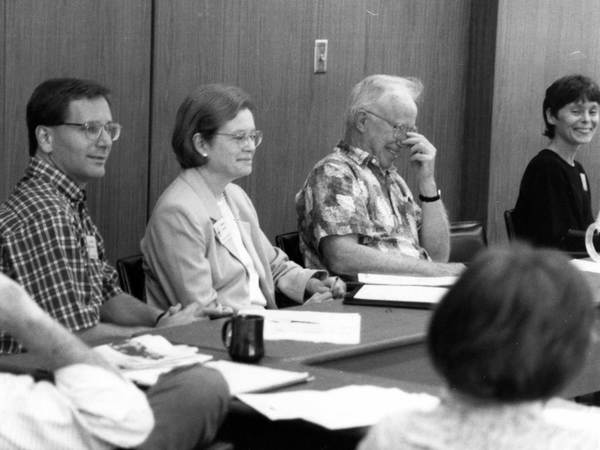 Tim Matovina, Mary Oates, Phil Gleason, Ellen Skerrett
Tim Matovina, Mary Oates, Phil Gleason, Ellen Skerrett
How amazed I was in 1975 by Cushwa Center director Jay Dolan’s pioneering effort to encourage historians to incorporate the critical role of gender in studies of American Catholicism. At the time, it seemed to me to be an impossible goal. However, as later directors also took it as a top priority, I decided that the Cushwa Center was a transformative place.
Among many Cushwa programs that I benefited from over the years, I remember several with special admiration. The earliest was a 1987 conference on women religious. This was a groundbreaking program, not only for its atypical focus, but also because it gave rise to the Conference on the History of Women Religious, an organization that continues to attract an international, ecumenical membership to its triennial meetings. I recall a 1995 Cushwa conference on engendering American Catholic studies as another extraordinary initiative that did much to enlarge the scope of “acceptable” historical research. But a 2000 conference on Catholicism in 20th-century America was particularly memorable because its program integrated the experiences of religious sisters and laywomen on equal terms with those of their male counterparts. And that, after all, was one of Cushwa’s earliest goals. Ad multos annos.
—Mary J. Oates, CSJ
Professor Emerita, Regis College
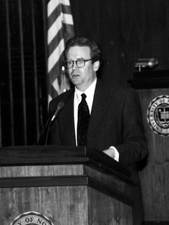 Jim Fisher
Jim Fisher
I rode the Greyhound from New York’s ‘Port of Authority’ bus terminal to South Bend in November 1982: my first Cushwa conference was also the occasion of my first-ever conference presentation, an event organized by my dear friend Jeff Burns. Later that night I fell in with a group that followed Jay Dolan into a faculty club somewhere on campus: Jay spoke briefly with the management prior to heading home to his family. The rest of us stayed until near dawn enjoying Jay’s hospitality. I made some lifelong pals that night including Dave O’Brien and Chris Kauffman and others that made for a wonderful floating parish over the next two decades.
—James T. Fisher
Professor, Fordham University
My days as a participant in the Cushwa Center’s Seminar in American Religion go back to the beginning, when I arrived as a graduate student in the history department in the fall of 1976...those early/glory days filled me with a great sense of appreciation for colleagues like Jeff Burns and Bill Miscamble, and my wonderful professors/ mentors: Phil Gleason, Jay Dolan, and Nathan Hatch, and Bob Fitzsimons and Father Marvin O’Connell, as well.
I well recall a dinner at the Morris Inn when Martin Marty came to town. I was just starting out, and it was the equivalent of meeting a rock star! There is something most fitting about the fact that at the Seminar on Grant Wacker’s Billy Graham book Billy Graham last spring (see page 1), there was Marty again—a most fitting glance back at 40 years come full circle, thanks to the wonders of the Seminar, and the generosity of the Cushwas.
—Kathleen L. Riley
Professor, Ohio Dominican University
My best Cushwa memory is from the summer of 1986 when I was a young untenured professor. With a Cushwa Travel Grant, I spent a few weeks at Notre Dame working in the archives and library and enjoyed the hospitality of Jay Dolan and Phil Gleason. I still consult the three boxes of large index cards from that trip. Then there was the editorial meeting with Scott Appleby and Patricia Byrne when Scott took us to a rousing John Fogarty concert in South Bend. There was Peter D’Agostino presenting on Rome in America, and the somewhat contentious conference concluded by Jay Dolan with something like these words: “You just have to do your work, run it up the flag pole, and let people shoot at it.”
—Bill Portier
Professor, University of Dayton
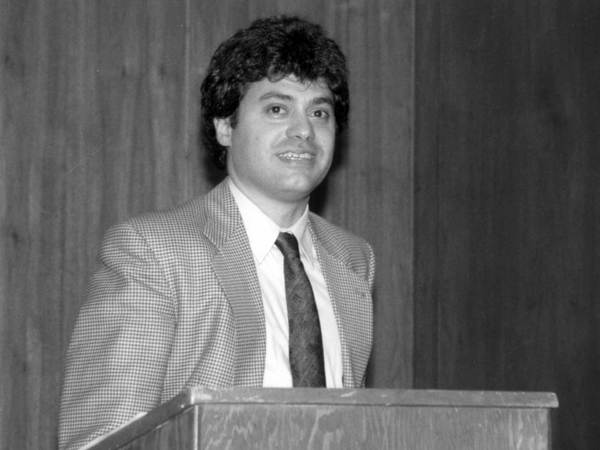 Peter D'Agostino
Peter D'Agostino
I distinctly remember my first Cushwa gathering better than I remember the precise date, though I think it was about 1980. Our two boys, then 5 and 2, loved running up and down the old Morris Inn’s glorious green-carpeted hallways, and dad experienced the first of many Cushwa Friday dinners, the “fresh-frozen” filet only a preview to Jay Dolan’s always avuncular greetings to historians concentrating on American religion.
The camaraderie plus the Saturday morning book discussions changed a colonialist’s career. They provided the courage to teach a lecture course specifically on American religion at the distinctly secular Chicago Circle, now UIC, and to double down on a book project that became Awash in a Sea of Faith—going all the way up to Abraham Lincoln.
Above all, Cushwa created and cemented personal friendships. One stands for the many: Peter D’Agostino. I will never forget Peter’s warm smile, after his book had been discussed at the Saturday session, as he described his joy at being the father of his delightful Rita. Amidst the tragic loss of Peter, it’s his smile I remember, one I saw like so many others only because of Cushwa.
—Jon Butler
Professor Emeritus, Yale University
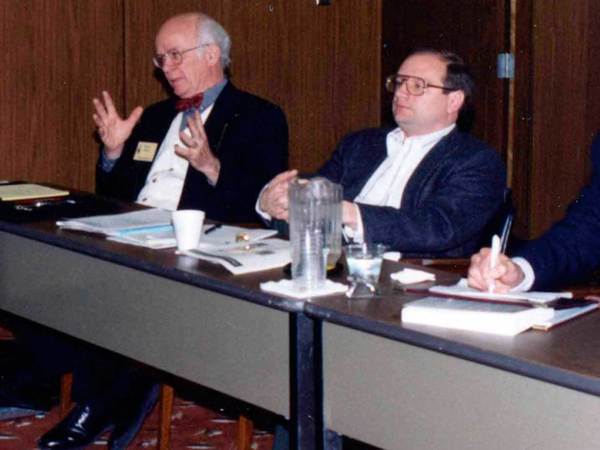 Martin Marty & Scott Appleby
Martin Marty & Scott Appleby
I had often been to conferences and consultations at the University of Notre Dame, and profited from the times some of its resources were directed to our field of study, American religious history. But when the Cushwa family stepped up to lend its name and provide resources for the Cushwa Center there was a qualitative leap in the character of programs and continuity between sessions. For me, one of the greatest assets of the Center programs was this: that I got to know the colleagues “down the block,” as it were, in the Midwest neighborhood. Such acquaintanceships were beneficial in the program- and research-endeavors of our schools. But, more deliciously, it helped enhance friendships, something often hard to nurture in the busy academy.
—Martin E. Marty
Professor Emeritus, University of Chicago
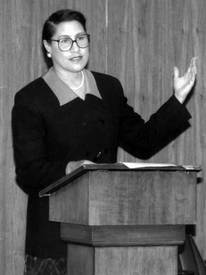 Evelyn Brooks Higginbotham
Evelyn Brooks Higginbotham
As a young non-Catholic American historian interested in American religion, but not yet very well versed in American Catholicism, the early Seminar in American Religion was a true godsend in every sense. The amazing cohort of folks who regularly participated under the remarkable leadership of Jay Dolan provided tremendous knowledge and stimulation for me and others. As should be well known, the early Seminar was a crucible for nurturing what eventually became a “Who’s Who” of American religious history—George Marsden, Nathan Hatch, Jan Shipps, Mark Noll, Joel Carpenter, Jon Butler, Mary Jo Weaver, Jim Bratt, and many more—as well as an opportunity to learn from noted scholars like Philip Gleason, Martin Marty, David O’Brien, Peter Williams, and others who periodically presented their work and commented on ours. It was as thoughtful and generous and inspirational an environment as could be imagined and I, like many others, benefited enormously from the exchanges and friendships it fostered.
As a particular personal memory, I recall the special hospitality and lively conversation provided in those years by Patricia McNeal Dolan. Pat was someone who always welcomed me and others with a great combination of wit and warmth, and as a Catholic historian herself she was especially helpful to me in learning about American Catholicism as experienced from the “inside” (though it was a long time before I learned that she was a former sister!). Cushwa was and is a very special place—and no one should forget that Pat, as well as Jay, played a large role in making it so.
—Mel Piehl
Professor, Valparaiso University
My first exposure to Cushwa came in 1985, when I delivered a paper at the Center. I remember meeting then-director Jay Dolan—a bit like meeting the pope—and the glad surprise I felt at discovering a roomful of people interested in the history of American Catholicism. I hadn’t known there were so many of us.
Fast forward to the late 1990s, by which time Scott Appleby was director. It was Scott who devised and directed the “American Catholicism in the 20th Century” project—one of the high points of my own intellectual life. That project funded research for Catholics and Contraception: An American History, which I published in 2004. (I recall with particular fondness how graciously Tim Matovina presided at the Seminar in American Religion in 2005 when
Catholics and Contraception was the selection.) The project also supported the work of many others and underwrote our sustained group discussion. I’ve never experienced an academic environment where senior scholars, graduate students, and newly minted assistant professors worked together so fruitfully or with such mutual respect. In terms of scholarly output, moreover, the 20th-century project remains the most productive I’ve ever been associated with.
Which was my favorite Cushwa event? Despite my affection for the Notre Dame campus and Indiana’s gentle breezes, my hands-down favorite was the 2014 seminar in Rome. Espresso on the rooftop terrace, wine at lunch, a Corpus Christi procession led by Pope Francis himself—what’s not to like? I also gained a new appreciation for the challenges attendant on the transnational approach to the history of Catholicism. So much to learn, so little time! Wine with lunch, anyone? We can toast Cushwa on its 40th.
—Leslie Tentler
Professor Emerita, Catholic University of America
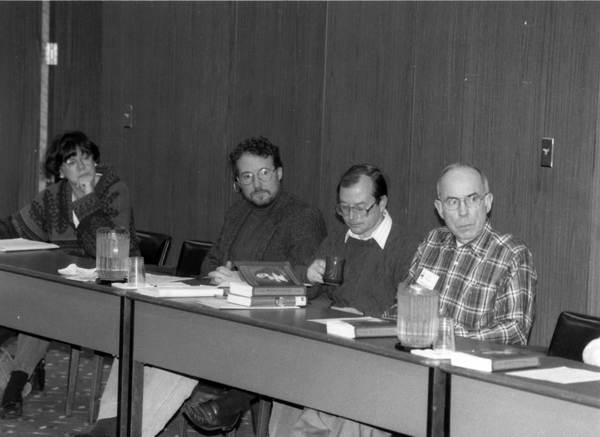 At the Seminar in American Religion
At the Seminar in American Religion
I loved the after-hours gatherings in that little no-name bar (I never knew its name, in any case) off the lobby of the old Morris Inn. It reminded me of the old Blarney Stone in the Bronx. The conversations went on and on; the always-outnumbered-but valiant staff—what was that nice bartender’s name, who’d let us go behind the bar ourselves later in the evening, to grab beers—rushing around with intrepid good cheer, bringing out spirits. I especially loved how the old warhorses, Dolan, O’Brien, Kaufman, etc. stayed up and talked and drank with the young folks (or maybe we stayed up and drank with them, it occurs to me now). Dolan and I swapped altar boy stories. Ad Deum qui laetificat, juventutem meum. . .
That said, for all those Catholics gathered in one place, our talk never became Catholic trivia, thank goodness. Jay, then Scott, then Tim, and now Kathy created such an open, welcoming, and generous environment, and such an intellectually exciting one, for which I am forever grateful. I was afraid to look the last time I was at the Morris Inn: is that little no-name bar still there? I’ll miss it if it’s not, but I look forward to the continuing conversation!
—Robert Orsi
Professor, Northwestern University
Dolan was my dissertation advisor and my boss at the Cushwa Center. He was always very solicitous toward me and made sure I was emotionally stable and fiscally sound.
In 1982 when I was the Cushwa Fellow, we planned a major conference, and invited Mary Jo Weaver to deliver the keynote address at the conference dinner. She was just completing her New Catholic Women. At the dinner a group of Hibernians attended to present the Cushwa Center with a check for the AOH’s endowment.
The group was sitting at the front of the dining hall and was having an extraordinarily good time. When Dolan was presented the check, the Hibernian speaker told a terrible joke. “Dr. Dolan picked me up at the airport this morning and his dog was in the car. He apologized and said he had to have his dog put down. I asked, “Is he mad?” and Dolan responded, “He’s not too happy about it.” The Hibernian table erupted with laughter. They did not, however, find Mary Jo Weaver’s feminist history as amusing. The looks on their faces varied from horror to astonishment. Dolan leaned over to me and said, “I’m glad we already received the check!”
—Jeff Burns
Professor, Franciscan School of Theology
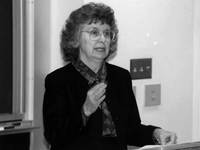 Angelyn Dries
Angelyn Dries
I began graduate studies at Notre Dame in the summer of 1975. I recall meeting Jay Dolan in the library entrance and him telling me about the founding of the Cushwa Center. He had great (and well-founded) hopes to make it a resource for scholarship in American Catholic history. When I finally got to Notre Dame in 1981 as a full-time doctoral student, the Center was up and running on the 6th floor of the library. I later became a “Cushwa Fellow,” which generously provided for my expenses in my last year or so of grad school. Throughout my years at Notre Dame, Cushwa ran seminars that would highlight recent publications and research in the field of Catholic history. Commenting would be big “stars” like Martin Marty and Dave O’Brien, but also scholars at the beginning of their careers. Under Scott Appleby, the Center took a hand in honoring stellar historians and contributors to the field. This included my beloved doctoral mentor, Phil Gleason, whose retirement symposium and banquet Cushwa helped underwrite.
Another conference highlighted the work of Christopher Kauffman who edited the U.S. Catholic Historian. These occasions brought folks together for stimulating scholarly discussion and reinforced the bonds of friendship that were often first created at those Cushwa events. Over adult libations, the waggish Jeff Burns used to separate the goats from the sheep in American Catholic studies, noting that a true scholar was “really Cushwa.” He was, of course, as was Joe White. I recall I barely made the cut since I worked with Phil Gleason and not Jay Dolan.
—Steven Avella
Professor, Marquette University
It’s no exaggeration to say much of the history of the Chicago Irish is in proverbial attics and basements. For an unaffiliated historian, grants from the Cushwa Center enabled me to do original research that has only deepened over the years. Little could I have known that a trip to the archives of the Sisters of Charity of the Blessed Virgin Mary in Dubuque, Iowa, in 1998 would result in articles and, more recently, a museum exhibit that challenges the narrative of Jane Addams and the Hull-House Settlement. I am very grateful to the Cushwa Center for the 2005 travel grant that enabled Mary Lesch and me to edit for publication the memoir of Francis O’Neill—the police captain who “saved” Irish music—and to prepare an appendix of the rare books in the Francis O’Neill Collection in Hesburgh Library.
—Ellen Skerrett
Independent Historian, Chicago
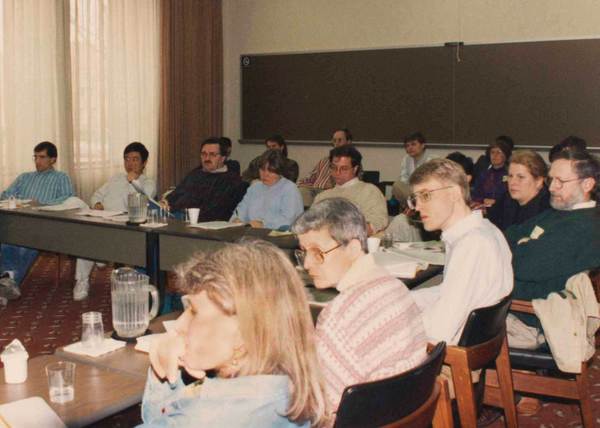 At the Seminar in American Religion (Charlotte Ames, Steve Nolt, George Marsden, and many others)
At the Seminar in American Religion (Charlotte Ames, Steve Nolt, George Marsden, and many others)
If universities like Notre Dame are the “place where the church does its thinking,” as Father Hesburgh once remarked, then the Cushwa Center is the place where historians of American
Catholicism do their thinking. While I knew little about Cushwa when I applied to graduate school, I quickly came to appreciate the programs it sponsored and the community it fostered. Not only was I exposed to some of the best and most innovative scholarship at Cushwa events, I had the chance to meet and converse with so many others who I now count among my friends and colleagues. More than any single experience, it is the memory of intellectual engagement and fellowship that I cherish.
—Thomas Rzeznik
Associate Professor, Seton Hall University
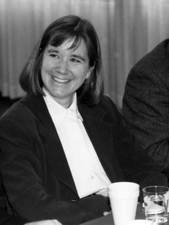 Catherine Brekus
Catherine Brekus
The Catholicism in the American Century Conference in April 2008 stands out for me as the moment when I determined for sure that I had chosen the right profession and field of study.
It was an all-star weekend of plenaries and panels, receptions, and post-conference conversations at the Morris Inn. I was in my 4th year of a Ph.D. program and a graduate assistant for Cushwa then. My role at the conference included recording the sessions and taking notes; but it was difficult to remain attentive to my assigned tasks once the discussions/debates started getting good. Thoughtful analysis, tough questions, collegiality, good humor, and a sense of mission animated that weekend and so many of my experiences with the Cushwa Center.
—Charles Strauss
Assistant Professor, Mount St. Mary’s University
First, a recurring and enduring pleasure at the majority of the events I experienced over 12 years was to see Bill and Anna Jean Cushwa there, participating in so many events and venues. I took a secret pleasure in the surprised moment that a visiting scholar realized that the family who endowed the center was in attendance! The longer I worked in the academe, the more I realized how exceptional the Cushwas truly are.
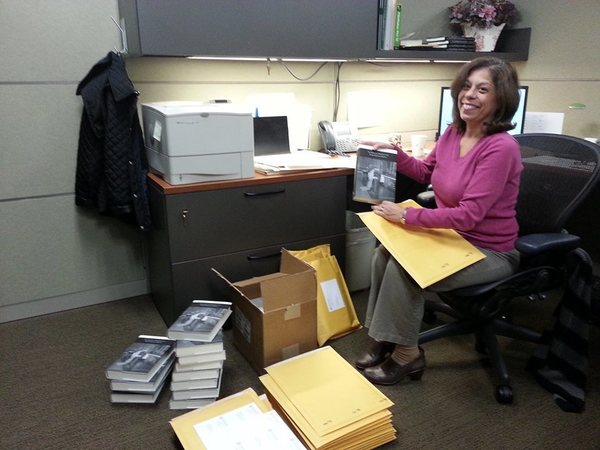 Paula Brach
Paula Brach
Second, never a week passed during my time at the Cushwa Center when the phrase “an embarrassment of riches” did not pop up in my thoughts, and often out my mouth. The resources of the university, the quality of the students, faculty, and visiting scholars were beyond all my expectation when I joined in 2002. Most especially though, the staff and leadership of the Cushwa Center during my time—so Scott, Barb, Tim, Kathy, and Heather—provided a rich atmosphere, a role model for my growing children, and made me feel I’d received more than my share of good luck: an embarrassment of riches indeed!
—Paula Brach
Senior Administrative Assistant Emerita (2002-2014)
It’s not an exaggeration to say that I am pursuing a doctorate in American history, and focusing my research on American Catholicism, thanks in large part to the Cushwa Center. As an undergraduate and seminarian at Notre Dame, my longtime love of American history, and of the Church, was fueled and focused by the Cushwa seminars and conferences I attended.
Over the past decade and more, the Cushwa Center has introduced me not only to the newest and most exciting scholarship on American religion, but also to the most accomplished scholars, and to the collaborative spirit that gratefully marks our field. And the Center’s programs and participants have shaped my priestly ministry, too, because of their willingness to engage the pastoral implications of their historical scholarship on the Church. Now as a graduate student, I’ve taken my first tentative steps as a scholar under the generous mentoring of the Center’s guiding lights—and my teachers—Scott Appleby, Tim Matovina, and Kathy Cummings.
I owe a very personal debt of gratitude to these fine people, and to Jay Dolan and the Cushwa family, as I have benefited so much from the fruits of their tremendous vision.
—Stephen M. Koeth, C.S.C.
Ph.D. Candidate, Columbia University
---
This feature appeared in the Fall 2015 issue of the American Catholic Studies Newsletter.